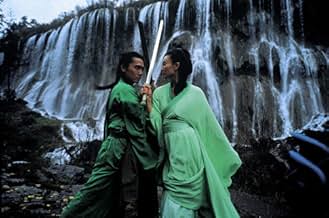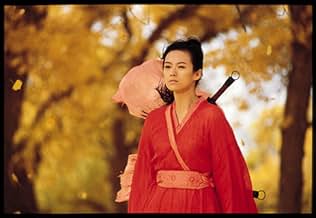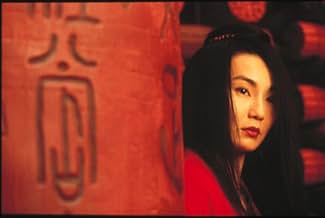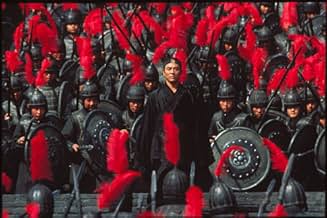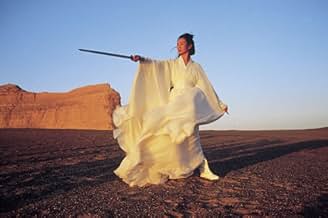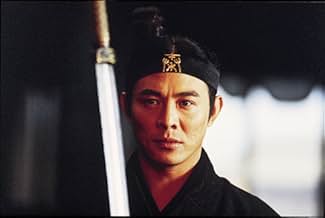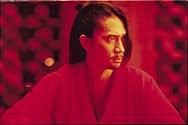El guerrero Sin Nombre llega al palacio del rey Qin y narra la historia de como acabó con tres perversos asesinos que aterrorizaban a China.El guerrero Sin Nombre llega al palacio del rey Qin y narra la historia de como acabó con tres perversos asesinos que aterrorizaban a China.El guerrero Sin Nombre llega al palacio del rey Qin y narra la historia de como acabó con tres perversos asesinos que aterrorizaban a China.
- Nominado para 1 premio Óscar
- 46 premios y 48 nominaciones en total
- Broken Sword
- (as Tony Leung Chiu-Wai)
- Flying Snow
- (as Maggie Cheung Man-Yuk)
- Moon
- (as Zhang Ziyi)
- King
- (as Chen Dao Ming)
- Scholar
- (as Liu Zhong Yuan)
- Old Servant
- (as Zheng Tian Yong)
- Commander
- (as Zhang Ya Kun)
- Seven Qin Guards
- (as Hei Zi)
Argumento
¿Sabías que...?
- CuriosidadesThe "red fight" between Moon and Flying-Snow was filmed in a forest in Mongolia. Director Yimou Zhang had to wait until the leaves turn yellow, and hired local nomads to gather even more yellow leaves in order to cover the ground completely. In fact, he was so fanatic about the leaves, that he had his crew separate the leaves into four different "classes" which were each put at increasingly farther lengths from the camera.
- PifiasAt the beginning of the movie, subtitles state that China was divided into seven warring states. At the end, the subtitles then state that "the King of Qin" unified China, without specifying which one. Historically, the king that was the one to unite all of the Chinese states was Ying Zheng (later changed name to Shi Huang Di) who inherited the throne from his deceased father at age 13 (as opposed to the age of the king in the movie). At the time, Ying Zheng began to rule China, the seven states were already reduced to two larger states (Qin and Chu) which was later dominated by Qin when Ying Zheng was 22 years old. It is therefore impossible for the same king shown in the movie to be the king that united all the Chinese states, although the end-note is semantically correct.
- Citas
King of Qin: I have just come to a realization! This scroll by Broken Sword contains no secrets of his swordsmanship. What this reveals is his highest ideal. In the first state, man and sword become one and each other. Here, even a blade of grass can be used as a lethal weapon. In the next stage, the sword resides not in the hand but in the heart. Even without a weapon, the warrior can slay his enemy from a hundred paces. But the ultimate ideal is when the sword disappears altogether. The warrior embraces all around him. The desire to kill no longer exists. Only peace remains.
- Versiones alternativasThe Director's Cut was 107:15 minutes, compared to the theatrical version at 96:23 minutes.
- ConexionesEdited into Ying xiong: Cause - The Birth of Hero (2002)
Hero is two sides of a tale as presented by Nameless (Jet Li), a mere Prefect who defeated three deadly assassins, and the King of Qin (Daoming Chen), the man the assassins wished to kill. Nameless weaves his heroic though modest story of how he killed the assassins, but the King remains unconvinced, spinning his own version of how he believed events unfolded.
Director Yimou Zhang takes us through Nameless' story first, spreading the battle sequences thick, allowing them to take their own time. In the King's version, certain battles are then revised, which is remarkably brave considering that some battles are utter fabrications. In one such fictitious fight, in a faultlessly designed set, Nameless and Sky (Donnie Yen) close their eyes and fight out the battle within their minds. Screen time is being spent lavishly on showing how two characters contemplated a fight, whilst fighting each other in a battle that never occurred. It is confusing certainly, but perhaps Zhang wished for his audience to get lost in the plot's design so that they would not question the warrantability of half of the battle sequences, which make up most of the film.
Yet, it is difficult to ponder these details when they are made so utterly insignificant when viewing such a spectacle. The sheer beauty of the battles, the gentle floating of the assassins as they fly around their arenas (which range from a forest full of orange leafed trees, crisp leaves falling down to the ground like rain, to the crystal clear and calm of a mountain lake), the costumes of characters at varying stages in the story line (red for passion, green for youth, white for truth, blue for love), the amazing army scenes which feature thousands of arrows being fired into the sky to create a black cloud that descends right on top of the camera, all these elements combine to produce a faultlessly perfect image on the screen, each frame a worthy photograph that gently reminds you why cinema is the greatest art form of the twentieth century.
And characterisation is not lost in this beauty as one may have feared. Despite the irritating two dimensional performance of Zhang Ziyi as Moon, the other actors carry off fine performances, especially Tony Leung Chiu Wai as Broken Sword and Daoming Chen as the King. Their performances are especially credible as they are often drowning in the memories of the King and Nameless - they need to change slight mannerisms in order to reflect whose mind they are now in.
The script too is of an impressively high standard. The moments of clarity that the warriors feel are experienced by the audience also, and there are some very informed outlooks of the emptiness of warfare, communicating that to achieve peace, sometimes war is the only option. These messages of course seem fitting in our current times, underlining how ancient some of the methods of our governing body truly are.
Hero is undoubtedly a most beautiful and awe inspiring film. What it lacks in plot substance, it makes up for with structure and script. It elaborates on the ground work created by 'Crouching Tiger' and is an experience that I would encourage you to seek out, as long as you are willing to submit to the film and let it guide you through its world on its own terms.
Rating: 4/5
- the_usual_suspect
- 23 dic 2004
- Enlace permanente
Selecciones populares
Detalles
Taquilla
- Presupuesto
- 31.000.000 US$ (estimación)
- Recaudación en Estados Unidos y Canadá
- 53.710.019 US$
- Fin de semana de estreno en EE. UU. y Canadá
- 17.800.000 US$
- 29 ago 2004
- Recaudación en todo el mundo
- 177.395.557 US$
- Duración1 hora 47 minutos
- Color
- Mezcla de sonido
- Relación de aspecto
- 2.35 : 1
Contribuir a esta página





